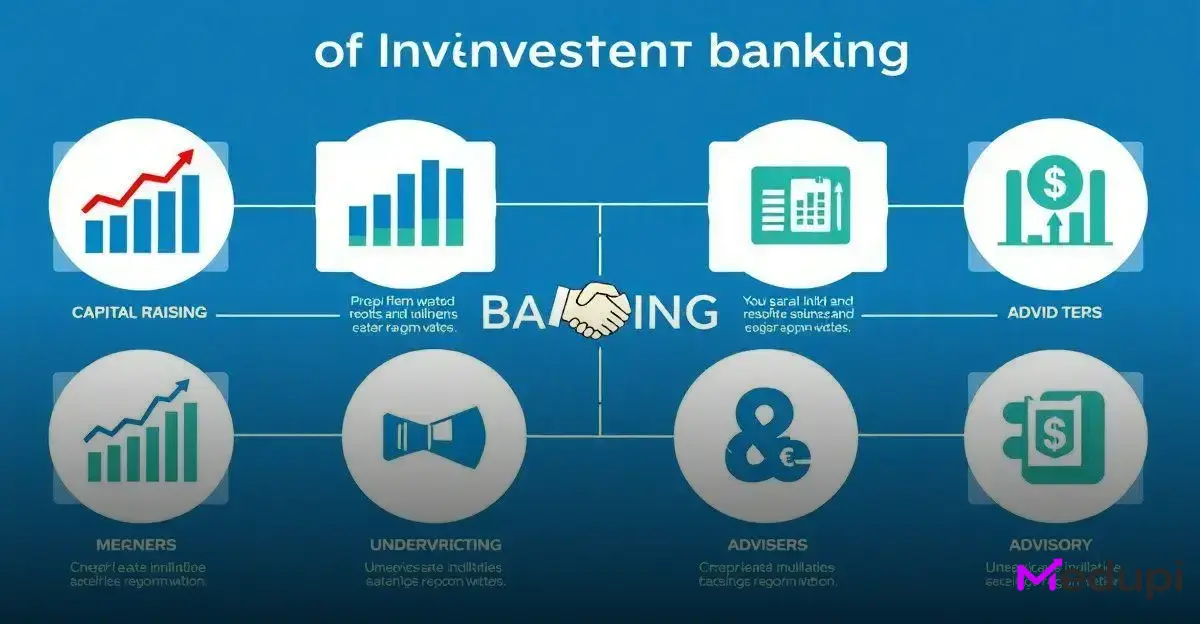ADVERTISEMENT
Investment banking plays a crucial role in the financial sector, connecting investors with corporations seeking capital.
It encompasses a variety of services, from underwriting to advisory roles, which are essential for businesses aiming to grow and navigate complex financial landscapes.
ADVERTISEMENT
What is investment banking?
Investment banking is a financial service that helps organizations raise capital by underwriting or acting as an agent in issuing securities. This industry is pivotal to the economy, as it facilitates the flow of funds between investors and the companies that need those funds.
Investment bankers work closely with corporations, governments, and other institutions to support their financing and strategic goals.
ADVERTISEMENT
One key aspect of investment banking is the process of initial public offerings (IPOs), where companies issue shares to the public for the first time. This can provide significant capital for businesses looking to expand. Investment banks conduct thorough evaluations and set the price of these offerings to ensure maximum success.
Additionally, investment banks offer advisory services for mergers and acquisitions. They help companies find the right partners, evaluate potential deals, and navigate the complexities of these transactions. By leveraging their expertise, investment bankers can provide invaluable insights that help shape successful business strategies.
Overall, investment banking plays a crucial role in the health and growth of the economy, enabling businesses to access necessary funds and expert advice.
Key functions of investment banking

Investment banking serves several key functions in the financial industry, each critical for the economic landscape. One of the primary roles of investment banks is to assist companies in raising capital through the issuance of stocks and bonds. By underwriting these securities, they ensure that businesses have the funds needed to grow and develop.
Another significant function is mergers and acquisitions (M&A). Investment banks provide advisory services to help companies navigate these complex transactions. They evaluate potential buyers or sellers, assess the financial health of the companies, and negotiate terms to create favorable outcomes for their clients.
Investment banks also engage in trading and sales. They buy and sell securities on behalf of their clients and their own accounts. This function helps to provide liquidity in the markets, allowing investors to buy or sell without significantly impacting the price of the assets.
Furthermore, research is another essential function. Investment banks conduct extensive research on market trends, economic conditions, and various industries. This information is invaluable for clients making informed investment decisions.
In summary, the key functions of investment banking include raising capital, facilitating mergers and acquisitions, trading securities, and providing research. Each plays a vital role in helping businesses and investors achieve their financial goals.
Career opportunities in investment banking
Career opportunities in investment banking are diverse and appealing for those interested in finance. These roles can be highly rewarding in terms of both salary and personal growth.
One common entry point is as an analyst, where individuals support senior bankers by preparing presentations and conducting financial analysis. Analysts typically work long hours, but the experience gained is invaluable.
After gaining experience, many analysts move on to become associates. Associates take on more responsibilities, such as managing analysts, leading project workflows, and engaging directly with clients. This step can significantly enhance management and negotiation skills.
As professionals advance, they can aim for positions such as Vice President (VP) or Director within their investment firm. These roles involve strategic decision-making and require a wealth of experience. At this level, professionals are often involved in high-stakes negotiations and client relationships.
For those aspiring to the top, reaching the level of Managing Director (MD) is the ultimate goal. MDs are responsible for directing teams, securing new business, and maintaining client satisfaction. This position demands a robust network and exceptional leadership abilities.
Additionally, many investment bankers may choose to branch out into other areas of finance, such as private equity or hedge funds. The skills gained in investment banking are highly transferable, making the industry attractive for career mobility.
Challenges in investment banking

Investment banking faces numerous challenges that can significantly impact financial transactions and services. One of the main issues is market volatility. Fluctuating prices can create uncertainty, which complicates deal-making and reduces client confidence. This volatility makes it difficult for banks to accurately assess risks and forecast outcomes.
Another challenge is the regulatory pressure faced by investment banks. Operating in a heavily regulated environment, these institutions must ensure compliance with constantly changing laws. Adhering to legal standards for every transaction can be a complex and demanding process.
Technological advancements, while offering new opportunities, also present challenges. Investment banks need to invest in cutting-edge technologies to improve efficiency, but they must also prioritize cybersecurity to protect sensitive data from breaches.
Attracting and retaining top talent is another ongoing challenge. In such a competitive industry, firms must create environments that foster professional growth and satisfaction to maintain a high level of service.
Lastly, global competition intensifies these challenges. Investment banks need to navigate complex international markets while competing with firms from around the world. This requires constant innovation and the ability to adapt strategies for different regions.
The future of investment banking
The future of investment banking is set for significant changes driven by technology, regulation, and market dynamics. As artificial intelligence (AI) evolves, investment banks are likely to adopt AI-driven tools to enhance operational efficiency, improve data analysis, and provide personalized client services. This adoption will enable firms to process vast amounts of data quickly, facilitating more informed investment decisions.
Another critical area is the shift toward sustainable finance. With increasing awareness of environmental and social governance (ESG), investment banks are expected to develop strategies that prioritize sustainability, advising clients on investments that are both profitable and socially responsible.
Fintech companies are also reshaping the investment banking landscape. These firms introduce innovative solutions that challenge traditional banking practices, prompting established banks to enhance their services and competitiveness through technological advancements.
Moreover, as regulations become stricter, investment banks must focus on compliance and transparency. Adapting to these changes is essential for maintaining trust and ensuring long-term success.
In summary, the future of investment banking will be characterized by technological innovations, sustainable practices, and heightened regulatory standards. Embracing these trends will be crucial for investment banks seeking to thrive in a rapidly changing environment.
Adapting to innovation and sustainability: The future of investment banking
Investment banking faces a dynamic future characterized by technological advancements, sustainable practices, and stringent regulations.
The integration of artificial intelligence will enhance decision-making and operational efficiency, while a focus on sustainability will attract clients looking for responsible investments.
As competition shifts with the rise of fintech companies, traditional investment banks must adapt to stay relevant.
Embracing these changes and prioritizing compliance will be essential in maintaining trust and achieving long-term success in the industry.
In conclusion, the landscape of investment banking is rapidly evolving, and those who proactively embrace innovation and sustainability will likely lead the way.





